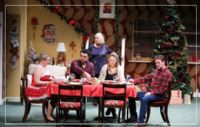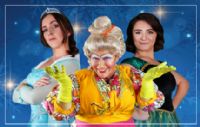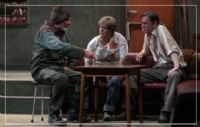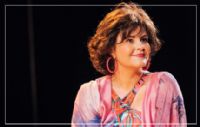Theatre Review: Sorcha's Story
Date: 14/07/2016
Theatre Review
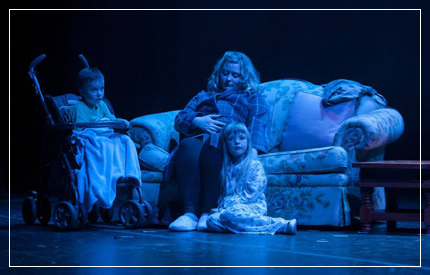
A compelling representation of autism in children, teenagers and even parents, Sorcha's Story is a tightly woven and sometimes poignant production that entertains and explains through song and performance, in a neither sappy nor sermonising fashion.
In my time, the social and communicative aspects of autism have often been explored, directly or indirectly, through comedy and drama. Various fictional characterisations have depicted autism as a coping mechanism, autism as humour, but also autism as a gift, with elements of loyalty, intelligence and creativity that no stigma can diminish.
Sorcha's (true) Story, particularly in its second act, is mainly about the creativity of its cast and central character. Hence the decision to tell it as a musical. It is an inspired choice from writer Conor Doherty, producer Denise White and the Something Special theatre group, whose on stage bond is fully felt in a rather packed Millennium Forum.
First, we are treated to an enlightening and heart-warming video of the rehearsal process, before Muire McCallion enters as Margaret, a married mother-of-two all too happy to celebrate life. That is, until we cut to a month later, where she is being kept awake by two newly born children. One, Patrick, is mildly autistic; the other, Sorcha, is severely so. With a spanner thrown into the works of her apparent tranquility, despite her best friend's reassurance, she stubbornly refuses to accept what the doctor is spelling out to her: Sorcha may struggle to look at, even speak to, her mother, for some time. And that's only the beginning.
It is to McCallion's credit that she conveys Margaret's musical and spoken cries for help during this terrifying period, for both her and Sorcha, as sympathetic and not self-pitying. When she sings about how she loves Sorcha but can't accept what she's being told, it's as strong a depiction of being forced to break from a comforting routine - one of the most common facets of autism - as one can hope to see.
If, as we will later find, Sorcha needs her own space and unique way of thinking to express herself, so does Margaret, and the emotional ballads we hear magnify this. It's what I call the Rain Man dichotomy - are aspects of Charlie Babbitt's behaviour all that different from Raymond's? - at its very best.
Things take a brighter turn when seven-year-old Sorcha (Evie Connor) begins singing The Lighthouse Family's High and addresses Margaret for the first time. It's the joyous breakthrough required to send everyone out of the theatre in an upbeat state and come back ready to cope with the trials and tribulations of teenage Sorcha (Sorcha Friel).
Up until now, Sorcha has mainly been able to shut herself off into an existence seemingly unburdened by the troubles of the world, by retreating into her room and listening to music on her headphones. But her inexperience with social niceties, alas, is about to catch up.
Act Two's opening number Who Am I? is followed by an energetically choreographed nightmare-scape featuring clowns, ghosts, and monsters, the literal demons in Sorcha's mind. Her identity and fear of identity loss are laid clearest here, fears that continue to exist at school in a more common but more inventively told narrative of bullies, boys, cliques, and the tear-jerking, impromptu rendition of She Moves Through The Fair that convinces a teacher to channel young Sorcha's talents into music.
It is the emotional pinnacle of this tale of love, heartbreak, joy, fitting in and much more, explored by a committed and charismatic ensemble through several musical genres. When the play concludes, we know and feel for sure that "Sorcha has found her voice... and now she, and many others like her, are determined to be heard."
Simon Fallaha
Sorcha's Story was performed at the Millennium Forum on June 30. Keep up to date with future shows at millenniumforum.co.uk, FB/MillenniumForum and T@MillenniumForum
In my time, the social and communicative aspects of autism have often been explored, directly or indirectly, through comedy and drama. Various fictional characterisations have depicted autism as a coping mechanism, autism as humour, but also autism as a gift, with elements of loyalty, intelligence and creativity that no stigma can diminish.
Sorcha's (true) Story, particularly in its second act, is mainly about the creativity of its cast and central character. Hence the decision to tell it as a musical. It is an inspired choice from writer Conor Doherty, producer Denise White and the Something Special theatre group, whose on stage bond is fully felt in a rather packed Millennium Forum.
First, we are treated to an enlightening and heart-warming video of the rehearsal process, before Muire McCallion enters as Margaret, a married mother-of-two all too happy to celebrate life. That is, until we cut to a month later, where she is being kept awake by two newly born children. One, Patrick, is mildly autistic; the other, Sorcha, is severely so. With a spanner thrown into the works of her apparent tranquility, despite her best friend's reassurance, she stubbornly refuses to accept what the doctor is spelling out to her: Sorcha may struggle to look at, even speak to, her mother, for some time. And that's only the beginning.
It is to McCallion's credit that she conveys Margaret's musical and spoken cries for help during this terrifying period, for both her and Sorcha, as sympathetic and not self-pitying. When she sings about how she loves Sorcha but can't accept what she's being told, it's as strong a depiction of being forced to break from a comforting routine - one of the most common facets of autism - as one can hope to see.
If, as we will later find, Sorcha needs her own space and unique way of thinking to express herself, so does Margaret, and the emotional ballads we hear magnify this. It's what I call the Rain Man dichotomy - are aspects of Charlie Babbitt's behaviour all that different from Raymond's? - at its very best.
Things take a brighter turn when seven-year-old Sorcha (Evie Connor) begins singing The Lighthouse Family's High and addresses Margaret for the first time. It's the joyous breakthrough required to send everyone out of the theatre in an upbeat state and come back ready to cope with the trials and tribulations of teenage Sorcha (Sorcha Friel).
Up until now, Sorcha has mainly been able to shut herself off into an existence seemingly unburdened by the troubles of the world, by retreating into her room and listening to music on her headphones. But her inexperience with social niceties, alas, is about to catch up.
Act Two's opening number Who Am I? is followed by an energetically choreographed nightmare-scape featuring clowns, ghosts, and monsters, the literal demons in Sorcha's mind. Her identity and fear of identity loss are laid clearest here, fears that continue to exist at school in a more common but more inventively told narrative of bullies, boys, cliques, and the tear-jerking, impromptu rendition of She Moves Through The Fair that convinces a teacher to channel young Sorcha's talents into music.
It is the emotional pinnacle of this tale of love, heartbreak, joy, fitting in and much more, explored by a committed and charismatic ensemble through several musical genres. When the play concludes, we know and feel for sure that "Sorcha has found her voice... and now she, and many others like her, are determined to be heard."
Simon Fallaha
Sorcha's Story was performed at the Millennium Forum on June 30. Keep up to date with future shows at millenniumforum.co.uk, FB/MillenniumForum and T@MillenniumForum


























